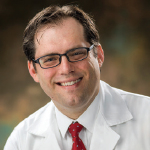Putting in sweat equity to help shape her field and make it more comprehensive alongside fellow otolaryngologists around the world has been life changing for Dr. Stern. “We care about evidence-based medicine,” she said. “Who is going to do that better than us?”
Explore This Issue
November 2018Dr. Chelius said one of the topics the Young Physicians Section is passionate about is racial and gender bias that impacts physicians not only interpersonally in their profession but also in the way they have historically provided care for patients. At the national meeting this fall, they are focusing the general assembly on racial and gender bias, bringing in Rice University Applied Psychologist Mikki Hebl, MD, a prominent national researcher who examines subtle ways in which discrimination is displayed, and how such discrimination is remediated by targets, allies, and organizations. “Being the leader of the Young Physicians Section has given me a platform to design programming about something my co-leaders and I really care about,” Dr. Chelius said. “What a cool opportunity we have to do this, and it’s an opportunity provided by all of the volunteering for leadership along the way.”
It’s Also Fun
Leading a medical society is definitely not all work and no play. Dr. Stern, who is getting ready to retire, said her involvement has led to friendships (and dinners) with otolaryngologists around the world. She has also enjoyed the exhilaration of working with young physicians and getting them excited about the other aspects of otolaryngology. “I think most surgeons and otolaryngologists are very engaged, active people full of energy,” she said. One of the things that has fulfilled me is knowing how comprehensive my engagement is with my specialty.”
Dr. Chelius looks forward to attending meetings because he’s excited to see the friends and colleagues he has made through societies over the years. “When I go to a national meeting, I smile for five days because I’m constantly seeing people I’m not used to seeing who are working just as hard as I am for the things I’m passionate about.”
Renée Bacher is a freelance medical writer based in Louisiana.
Tips for Reaching Leadership Positions
 Step Forward: “Don’t be scared to take a leap and step forward into the society. It was through volunteering for leadership roles in the Academy that I learned about the breadth and opportunities of the [organization].”—Danny Chelius, MD
Step Forward: “Don’t be scared to take a leap and step forward into the society. It was through volunteering for leadership roles in the Academy that I learned about the breadth and opportunities of the [organization].”—Danny Chelius, MD
 Speak Up: “It is important for people to hear your voice. You bring something new to the table.”—Samantha Anne, MD
Speak Up: “It is important for people to hear your voice. You bring something new to the table.”—Samantha Anne, MD